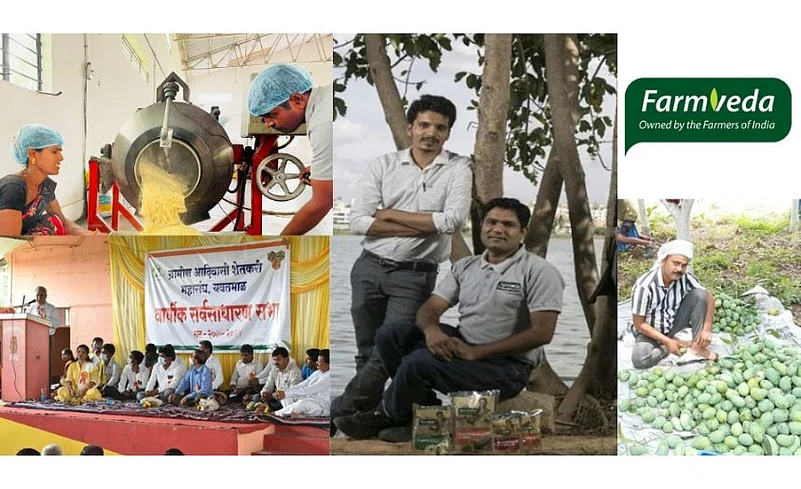In India, 46% of the population is directly engaged in agriculture 70% of families rely on agriculture for their livelihood (Digital Sansad and PIB). Despite this, agriculture contributed only 17% to India’s GDP in 2023, and this share is steadily declining. The Indian Agriculture sector faces numerous challenges typical of many developing countries, such as decreasing soil fertility, declining crop productivity, rising input costs, and poor price realization.
Challenges faced by Indian Farmers
The price disparity between the farm gate and the consumer’s table can be as much as five-fold, with production glut and supply chain disruptions worsening the situation.Volatile market prices and climate change along with other challenges lead farmers to succumb to the vicious cycles of debt and poverty, forcing many to leave farming and to migrate for wage labour.
According to the 77th National Sample Survey, Land & Livestock Holdings of Households and Situation Assessment of Agricultural Households, 2021, the monthly income of farming households in 2019 was only Rs 10,218 per month (around 40 percent of which was from wage labour). The farming crisis also led to increase in suicide rates among farmers. According to National Crime Records Bureau (NCRB) 2023 report, at least one farmer dies by suicide every hour in India.
Various ministries, agencies, and NGOs have attempted to address these issues through policy initiatives, farmer collectivization, field extension programs, price interventions, and marketing support. Unfortunately, the outcomes have been less than satisfactory.
Farmveda: Empowering Farmers to Boost Their Earnings
In the ever-evolving landscape of Indian agriculture, where farmers often grapple with fluctuating market prices and limited market access, Farmveda is emerging as a transformative force. The company's innovative approach is designed to empower Indian farmers by ensuring they receive fair prices for their produce and giving them a more influential role in the market.
How it all started
The farmer-cooperative movement led by Professor Trilochan Sastry, former Dean of IIM Bangalore, and the NGO Centre for Collective Development (CCD) was the genesis of Farmveda in 2003. CCD mobilized farmers to form cooperatives at the village level. Multiple cooperatives got together to become district level federations. Minimum support price (MSP) centres, production units and community-managed seeds systems were undertaken as part of the collectivisation efforts to increase farmers income and realize the goal of bringing economic prosperity among farmers.
After more than a decade of relentless efforts, Professor Sastry identified three critical gaps in farmers’ access to markets: the absence of a strong farmer brand for grains, pulses, and perishables (similar to what Amul achieved for dairy products), low-value addition post-harvest, and poor access to end consumers.
To overcome these gaps, Prof. Sastry established Farmveda (IndiaFarm Foods Pvt Ltd) in 2016 as a social enterprise owned by the farmers. Farmveda’s mission is to increase farmers’ share of the consumer’s food expenditure. Profits from value addition are returned to the farmers. Additionally, Farmveda helps farmers mitigate price risks by strategically moving their produce across geographies and time, aligning supply with demand.
Farm-to-Fork: A Direct Connection with Consumers
Farmveda’s approach goes beyond market transparency; it also focuses on eliminating intermediaries that often erode farmers' profits. The company connects farmers directly with buyers through its digital marketplace helping them retain a larger share of the sale price. This not only increases farmers’ incomes but also fosters a more efficient supply chain. The digital marketplace also facilitates bulk transactions and long-term contracts, providing farmers with stability and consistent revenue streams.
A key aspect of Farmveda’s strategy is to give farmers a greater say in the markets. Traditionally, farmers have had limited influence over pricing and market conditions, which has often left them vulnerable to exploitation. Farmveda changes this dynamic by collectivizing farmers in decision-making processes and market negotiations.This collaborative approach ensures that farmers' interests are considered, leading to fairer pricing and better markets.
Innovation at Farmveda
Innovation is at the heart of Farmveda’s operations. Farmveda’s CEO, Mr. Kaushalendra Yadav, emphasizes that the enterprise is “much more than a marketplace.” Being from a farming background, he is passionate about giving back to his roots. He strongly advocates appropriate technology innovation. Farmveda’s factory in Ananthpuramu District, Andhra Pradesh, is a must-visit for any aspiring food entrepreneur. The facility boasts state-of-the-art equipment for sorting, cleaning, and packaging produce, and the team collaborates with food scientists to extend the shelf life of food without chemical additives.
Value addition at Farmveda
At Farmveda, the team continually experiments with creating value-added products from fresh, high-quality ingredients sourced directly from farmers. Farmveda’s value added offerings, such as chikkis, instant mixes, and ready-to-cook foods, have become consumer favourites. By adding value to raw agricultural products and reducing the number of intermediaries in the farm-to-fork chain, Farmveda ensures that farmers receive a larger share of the end-product value, thereby enhancing their income and financial stability. Farmveda’s Head of Operations, Mr. Shivam Shukla manages the relationship with more than 50000 farmers and workflow at the factory.
FarmPhone: Easy ordering through Whatsapp
Another innovative solution to enhance and simplify the ordering process is the launch of FarmPhone. In partnership with GramVaani and Magasool Pvt Ltd, Farmveda launched “FarmPhone,” a vernacular, intuitive, and interactive digital commerce platform that facilitates transparent and connected fair trade among farmers, farmer producer organizations (FPOs), food processors, and consumers.
Mango Mania: Seasonal Organic fruits
This year, consumers in Bangalore enjoyed a variety of pesticide-free mangoes, including Himmayat, Kesar, Dussehri, Langda, Chaunsa, and Amrapalli, sourced from Andhra Pradesh, Bihar, and Uttar Pradesh. Harvest and delivery was completed within 3 to 4 days, with fruits naturally ripened in boxes. Farmers received 40% to 70% more than the local mandi rates.
Mr. Shukla proudly shares that many customers gave feedback that the mangoes were amongst the best that they had ever tasted. In collaboration with the FarmPhone team, plans are afoot to bring high-quality seasonal fruits to end customers throughout the year in multiple Indian cities.
The Road Ahead
As Farmveda continues to grow and evolve, its focus remains firmly on creating a positive impact on both the agricultural industry and the environment. The company’s dedication to innovation, sustainability, and education positions it as a leader in the future of farming.
Farmveda’s efforts are aligned with a broader vision of creating a more sustainable and equitable agricultural sector in India. By focusing on fair pricing, direct market access, and farmer empowerment, the company is addressing some of the most pressing issues in Indian agriculture.
The impact of Farmveda’s approach is already being felt across the country. Farmers are experiencing improved incomes on an average of 10% to 35% depending on crop, season and market conditions, greater market influence, and a stronger sense of financial stability. Much remains to be done to connect crores of Indian farmers with crores of Indian consumers in a way that 3Ps are balanced – People, Profit, and Planet.






















